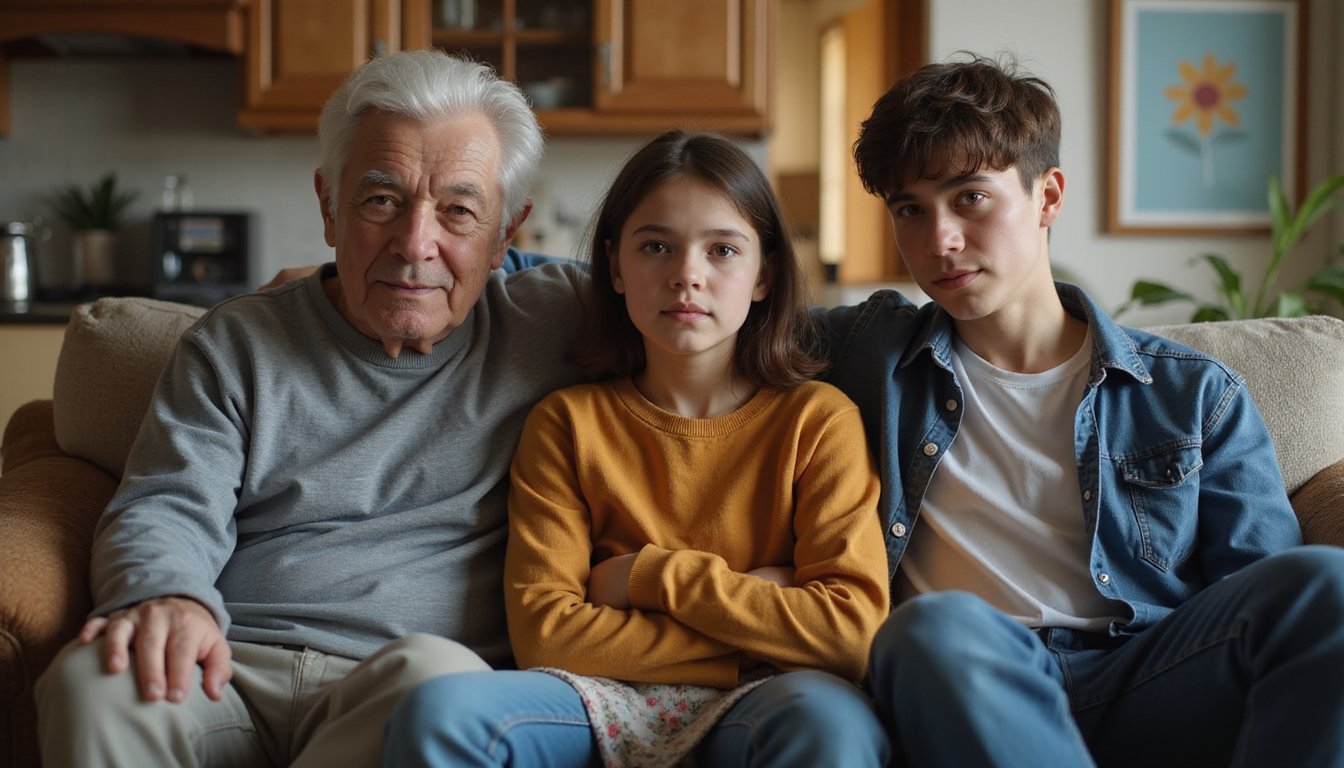You can break the cycle of generational trauma through targeted healing strategies and conscious awareness of inherited patterns. Research shows trauma affects families through biological, psychological, and social mechanisms – impacting everything from gene expression to parenting styles. Start by recognizing signs like emotional numbness, strained relationships, or maladaptive coping behaviors. Evidence-based approaches, including therapy, skill-building, and family interventions can help you create healthier patterns. Understanding these dynamics opens the door to lasting transformation.
Understanding the Root Causes of Generational Trauma

While the transmission of generational trauma may seem mysterious, research reveals distinct biological, psychological, and sociocultural mechanisms that perpetuate emotional wounds across generations. Your inherited emotional pain can stem from epigenetic changes that alter gene expression, potentially affecting up to four generations of descendants. These biological markers may increase your susceptibility to anxiety, depression, and PTSD. Studies show that mothers who experienced PTSD from terror attacks passed on lower cortisol levels to their children, impacting their ability to manage stress.
Family history trauma manifests through learned behaviors, communication patterns, and parenting styles shaped by unresolved past experiences. You might unconsciously adopt coping mechanisms, such as emotional withdrawal or aggression, that your family members used. Direct exposure to trauma frequently occurs when children witness disturbing events within their family environment. Descendants of trauma survivors often experience collective suffering that shapes their cultural identity and psychological well-being. Additionally, intergenerational trauma often intensifies through systemic factors like discrimination, poverty, and cultural silence around traumatic events, creating a complex web of psychological and social impacts that persist across time.
Signs Your Family May Be Affected by Historical Trauma
Recognizing the signs of generational trauma in your family system marks the first step toward breaking inherited patterns of pain. These generational patterns often manifest in subtle yet pervasive ways that affect your daily functioning and relationships. Research shows that physiological stress responses from trauma can be biologically inherited by future generations.
Breaking the chains of generational trauma begins with awareness, as ancestral pain often silently shapes our present-day experiences and connections.
Key indicators that your family carries historical trauma include:
- Emotional numbness or difficulty expressing feelings, coupled with persistent anxiety, depression, or unexplained physical symptoms
- Strained relationships marked by trust issues, isolation, or repeated cycles of destructive behaviors
- Maladaptive coping mechanisms like substance use, overworking, or avoiding discussions about painful family history
Your family might also exhibit hypervigilance, chronic stress responses, or intense reactions to seemingly minor triggers. These reactions may stem from adverse childhood experiences that have been passed down through multiple generations. Many individuals find themselves unconsciously perpetuating unspoken messages learned in childhood about relationships and trust. Understanding these signs enables you to identify areas where healing interventions may be most beneficial for breaking the cycle.
The Science Behind Trauma’s Transmission Across Generations

Research into generational trauma has revealed complex biological, psychological, and social mechanisms that explain how emotional wounds pass from one generation to the next. Scientists have identified epigenetic modifications in trauma survivors that can alter gene expression in their offspring, particularly affecting stress response genes. Your family’s trauma history may influence your biology through changes in cortisol levels and stress hormone regulation. Individual traits combined with collective cultural resilience are essential for healing from generational wounds. Studies show that exposure to trauma during pregnancy can trigger mitochondrial dysfunction in offspring, leading to lasting neurological changes.
The transmission also occurs through attachment patterns and family dynamics. When your parents carry unresolved trauma, they may unconsciously project their anxieties onto you or create maladaptive parenting styles. This psychological inheritance manifests through broken communication, emotional enmeshment, and family secrets. Children often develop unexplained symptoms, anxiety, or depression, even without experiencing the original trauma directly. The cycle perpetuates through disrupted attachment and unprocessed grief across generations. The research team received no financial support for conducting these groundbreaking studies on generational trauma transmission.
Breaking Free: Healing Strategies for Families
As families confront the impact of generational trauma, evidence-based healing strategies offer concrete paths toward recovery and resilience. Research supports a multi-faceted approach combining psychoeducation, skill-building, and therapeutic interventions to break harmful cycles. Comprehensive assessments show that self-efficacy levels are crucial indicators of long-term recovery success. Studies show that family routines and structure play a crucial role in reducing trauma symptoms and behavioral problems in children. Proactively educating family members about trauma can help them understand that partner accommodation often increases distress and relationship dissatisfaction.
Three proven strategies for healing generational trauma:
- Engage in family-based trauma interventions that incorporate structured treatments and communication skills training, shown to reduce PTSD symptoms and improve family functioning
- Participate in collaborative coping programs that strengthen family connectedness through group-based interventions and resilience training
- Combine individual and dyadic therapy approaches to address both personal trauma symptoms and relationship dynamics simultaneously
These evidence-based methods provide families with practical tools for processing trauma, developing healthier interaction patterns, and building lasting resilience within the family system.
Building Resilient Future Generations

While healing past trauma remains essential, building resilience in future generations requires a thorough, data-driven approach across education, youth empowerment, and community engagement. You’ll find that integrating disaster risk reduction into educational curricula and leveraging digital technology creates a strong foundation for youth aged 15-24, who represent a significant portion of the resilience-building workforce.
To break the cycle effectively, you need to focus on developing core resilience skills like adaptability, grit, and self-efficacy. Strong social networks and community partnerships prove vital, as they enable faster recovery from environmental and socioeconomic shocks. The generation has already demonstrated remarkable unshakable calm during economic upheavals. Supporting vulnerable populations through real-time data collection allows for more targeted and effective interventions in trauma prevention. By implementing high-frequency monitoring systems and supporting vulnerable groups through targeted workshops and mentoring programs, you’ll help create a generation that’s better equipped to handle challenges and prevent the transmission of generational trauma.
Frequently Asked Questions
Can Generational Trauma Affect Physical Health Conditions and Chronic Illnesses?
Yes, generational trauma directly impacts your physical health through multiple pathways. You’ll find that trauma-induced stress disrupts your body’s regulatory systems, leading to higher rates of heart disease, diabetes, and autoimmune disorders. You’re also at risk through epigenetic changes, where trauma alters gene expression that’s passed down to future generations. Research shows you’re more susceptible to chronic inflammation, obesity, and metabolic conditions if your family has experienced significant trauma.
How Do You Maintain Boundaries While Supporting Family Members With Trauma?
You can maintain boundaries while supporting traumatized family members by establishing clear, consistent limits in your interactions. Set regular check-in times instead of being available 24/7, practice direct communication about your capacity to help, and don’t take on their emotional work. Engage professional support when needed, maintain your own self-care routines, and remember that healthy boundaries actually strengthen your ability to provide meaningful support without becoming overwhelmed.
What Role Does Forgiveness Play in Healing Generational Trauma?
Forgiveness plays a crucial role in healing generational trauma by reducing PTSD symptoms and breaking cycles of inherited pain. When you practice forgiveness, you’ll decrease trauma-related avoidance behaviors and transform negative emotions into resilience. It’s proven to restore trust within family systems, improve mental health outcomes, and foster self-compassion. You’ll find that both forgiving others and self-forgiveness are essential steps in dismantling destructive generational patterns.
Is It Possible to Heal Generational Trauma Without Family Participation?
Yes, you can heal from generational trauma without family participation. Through individual therapy, mindfulness practices, and support groups, you’ll develop the tools to process inherited trauma independently. While family involvement can enhance healing, it’s not essential. You can break harmful patterns by establishing boundaries, learning healthy coping skills, and building external support systems. Your personal healing journey can effectively transform generational patterns, even if you work through it alone.
When Should Children Be Told About Family Trauma History?
You should share family trauma history with children only when they demonstrate emotional readiness and have adequate coping skills. Start with basic information around age 8-12, depending on maturity, and adjust details based on their reactions. You’ll need to guarantee physical and psychological safety first, use age-appropriate language, and consider working with a therapist. Watch for signs of distress and avoid overwhelming them with excessive details.















